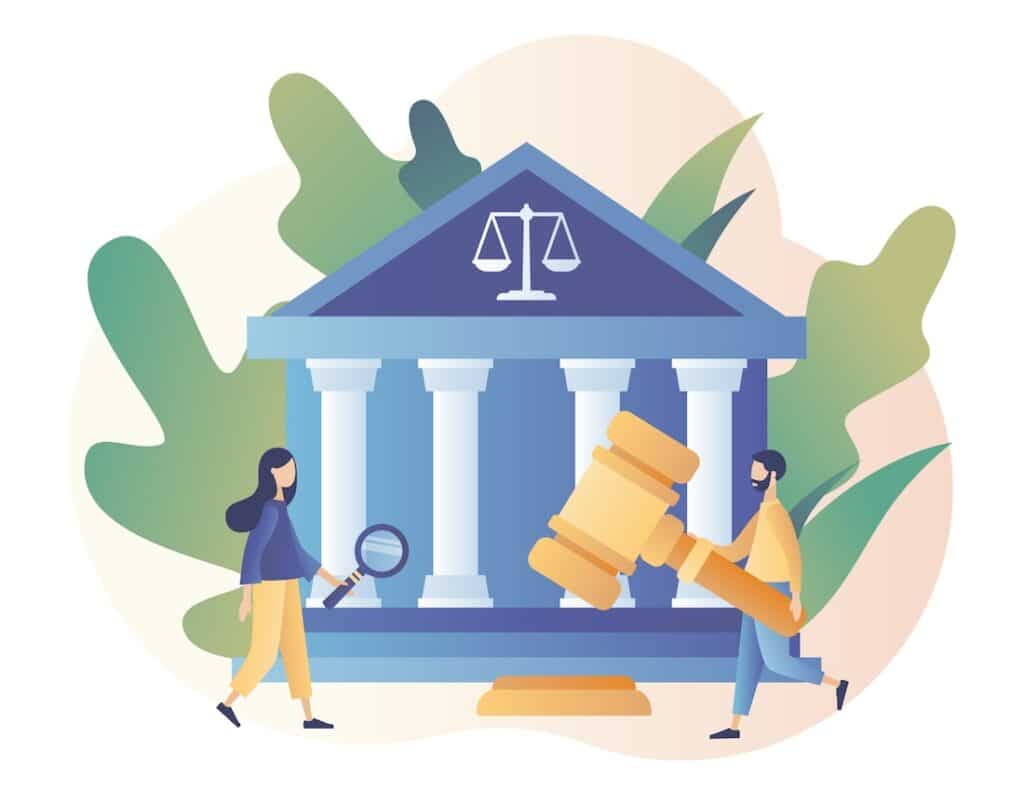Criminal Defense Attorney
Reno-Sparks-Carson City

Aggressive & Relentless Representation
When your freedom is on the line, you need a dedicated and experienced criminal defense attorney who will fight for you. At Mayhew Law, we understand the stress and uncertainty that come with facing criminal charges. Whether you’re dealing with DUI, drug offenses, domestic violence, theft, or any other criminal accusation, our firm is committed to protecting your rights and achieving the best possible outcome for your case.
With a decade of experience as a criminal defense attorney in Reno, Sparks and Carson City, we provide aggressive legal representation with a compassionate approach. We know that every case is unique, and we take the time to understand your situation, build a strong defense, and guide you through the legal process. Contact us to learn more.
Looking for more answers on hiring a criminal defense attorney?
See our FAQ below.
Committed to Your Defense
Criminal Defense
Frequently Asked Questions
Frequently Asked Questions
Important information for criminal defense.
If any of these pertain to your situation, contact a criminal defense attorney today!
Costs vary depending on the complexity of the case, the attorney’s experience, and the jurisdiction. Many attorneys offer free consultations to discuss your options.
Immediately. The sooner you hire an attorney, the better they can protect your rights, gather evidence, and build a strong defense. Waiting too long can put you at a disadvantage.
Once indicted, you will be formally charged and required to appear in court for an arraignment. From there, the case moves to pre-trial proceedings, plea negotiations, or trial.
Look for experience, a strong track record, clear communication, and someone who specializes in criminal defense. Read reviews, ask about case results, and ensure you feel comfortable with their approach.
- You have the right to remain silent.
- You have the right to an attorney.
- You have the right to refuse searches unless there is a warrant.
- You have the right to know if you are being arrested.
No. Many cases are resolved through plea agreements or are dismissed before trial. A skilled attorney can negotiate the best possible outcome.
Yes, if you believe there were legal errors in your trial, you may be able to appeal. An appeal does not re-try your case but examines whether mistakes were made that affected the outcome.
You have the right to remain silent, the right to an attorney, the right to a fair trial, and the right to be presumed innocent until proven guilty.
DUI convictions typically stay on your record for several years or permanently depending on state laws. Some states allow expungement under specific conditions.
If you cannot afford a private attorney, you may qualify for a public defender, but their caseloads are often heavy, so they may have limited time to dedicate to your case.
In some cases, yes. A defense attorney can engage with prosecutors during the pre-indictment phase to present evidence, negotiate reduced charges, or argue for no charges at all.
Yes. Even if you plan to plead guilty, an attorney can negotiate a better outcome, such as reduced charges, a lighter sentence, or alternative sentencing options.
Some attorneys offer payment plans or flat fees, while others require payment upfront. Ask about payment options during your initial consultation.
No ethical attorney can guarantee an outcome. However, an experienced attorney will fight for the best possible resolution based on the facts of your case.
Yes. Even if you are innocent, an investigation can lead to charges based on misinterpretations, false statements, or circumstantial evidence. An attorney ensures your rights are protected and prevents self-incrimination.
Missing a court date can result in a bench warrant for your arrest, additional charges, and a negative impact on your case. If you miss court, contact an attorney immediately.
Look for experience in criminal defense, a strong track record, and a clear communication style. A good attorney should be knowledgeable about local laws and dedicated to protecting your rights.
When hiring a DUI lawyer, consider:
- Experience handling DUI cases
- Success rate and client reviews
- Knowledge of local DUI laws
- Fee structure and payment options
While you have the right to represent yourself, it is not advisable. Criminal law is complex, and having an experienced attorney significantly increases the chances of a better outcome.
Yes, in some cases. Prosecutors may offer a pre-indictment plea agreement to resolve the case early. Your attorney can negotiate for a favorable outcome or explore options to avoid charges altogether.
A criminal defense attorney represents individuals accused of crimes, ensuring their legal rights are protected throughout the legal process. This includes advising clients, negotiating plea deals, representing them in court, and building a strong defense strategy.
Penalties vary by state but often include fines, probation, mandatory counseling, community service, and jail time. A felony conviction can result in harsher penalties, including prison time.
Pre-indictment refers to the stage before formal charges are filed against you. During this time, law enforcement and prosecutors may be investigating a case, gathering evidence, and deciding whether to pursue criminal charges.
Bail is a set amount of money that allows a defendant to be released from jail while awaiting trial. The court determines the amount based on the severity of the crime, flight risk, and criminal history.
Sometimes, a DUI can be reduced to reckless driving or another lesser charge through plea bargaining, depending on the circumstances of your case.
Domestic battery charges carry serious consequences. An experienced attorney can help protect your rights, build a strong defense, and negotiate the best possible outcome.
You may be under investigation if:
- Law enforcement contacts you for an interview.
- You receive a subpoena or search warrant.
- Friends, family, or coworkers are questioned about you.
- You receive a target letter from the U.S. Attorney’s Office.
A plea bargain is an agreement where the defendant pleads guilty to a lesser charge in exchange for a reduced sentence or other concessions. Many criminal cases are resolved this way.
It depends on the state and circumstances. Many first-time DUI offenses result in fines, probation, license suspension, and DUI classes, but some cases may include jail time, especially if there was an accident or high BAC.
Costs vary based on experience and complexity of the case. A DUI lawyer typically charges anywhere from $1,500 to $5,000+ for a first offense and much more for cases that go to trial.
Domestic battery specifically refers to unlawful physical contact, while domestic violence is a broader term that can include threats, harassment, and emotional abuse.
- 0.02% for drivers under 21 years old
- 0.04% for commercial licensed drivers
- 0.08% for everyone else
Remain calm, avoid contacting the accuser, and seek legal representation immediately. Anything you say or do can be used against you in court.
Jail time depends on the severity of the case, prior offenses, and local laws. Some first-time offenders may be eligible for alternative sentencing, such as probation or diversion programs.
Not necessarily. In many states, the prosecutor has the discretion to proceed with the case even if the alleged victim wants to drop the charges.
Law enforcement needs probable cause to make an arrest. However, the threshold for probable cause is lower than the standard of proof required for a conviction. An attorney can challenge weak or insufficient evidence in your case.
Common defenses include self-defense, false allegations, lack of evidence, and accidental contact. An experienced attorney can evaluate the specifics of your case to determine the best strategy.
Contact an attorney immediately. A subpoena may require you to provide testimony or documents. Your attorney can advise you on your rights and whether you should comply, contest, or negotiate the scope of the request.
It is strongly recommended to hire an attorney, especially if you face potential jail time, high fines, or a suspended license. An attorney can help negotiate lesser charges, challenge evidence, and guide you through the legal process.
While not guaranteed, an attorney may be able to get charges dismissed or reduced if there were errors in police procedure, faulty breathalyzer results, or violations of your rights.
No. You should never speak with law enforcement without an attorney present. Anything you say can be used against you, even if you believe you are innocent. Contact a criminal defense attorney immediately.
An arraignment is the first court appearance where the charges are formally read, and the defendant enters a plea (guilty, not guilty, or no contest). The judge may also set bail at this hearing.
In most cases, police need a warrant to search your home. However, there are exceptions, such as consent, emergencies, or if illegal activity is in plain sight. Vehicles have different rules, and police may search a car without a warrant if they have probable cause.
It depends on the complexity of the case, court schedules, and whether it goes to trial. Some cases are resolved in weeks, while others can take months or longer.
Yes, a DUI can significantly increase your insurance rates, and some insurers may drop your coverage entirely.
Domestic battery is a criminal offense involving physical contact or harm against a spouse, partner, family member, or household member. It is often charged as a misdemeanor but can be elevated to a felony depending on the circumstances.
Yes. A case may be dismissed if there is insufficient evidence, if constitutional rights were violated (such as illegal searches), or if procedural errors occurred. An attorney can file motions to dismiss if applicable.
Being charged does not automatically terminate parental rights, but it can impact custody and visitation, especially in family court proceedings.
Bring any documents related to your case, such as police reports, court documents, bail paperwork, and any communications with law enforcement. Be prepared to discuss the details of your case honestly.
Refusing a chemical test can result in automatic license suspension and other penalties under implied consent laws.
Remain calm, exercise your right to remain silent, and ask for an attorney immediately. Do not answer questions or sign anything without legal representation.
It depends on the circumstances of your case. A skilled attorney can negotiate with the prosecutor, challenge the evidence, and explore legal defenses that may lead to reduced charges, case dismissal, or alternative sentencing options.
Yes, a domestic battery conviction, even a misdemeanor, can result in the loss of firearm rights under federal and state laws.
A public defender is a court-appointed attorney provided to defendants who cannot afford a lawyer. A private attorney is hired and paid by the client. Private attorneys often have more time and resources to dedicate to a case.
Fees vary depending on the complexity of the case, the attorney’s experience, and the amount of work required. Some attorneys charge flat fees, while others charge hourly rates. Many offer initial consultations to discuss costs.
Understanding Nevada’s DUI Laws: What You Need to Know
Understanding Nevada’s DUI Laws: What You Need to KnowAt Mayhew Law, as criminal defense attorneys we understand that being charged with Driving Under the Influence (DUI) in Nevada can feel overwhelming. You may have questions about the laws, the penalties, and your options. In this article, we’ll explain Nevada’s DUI [...]
Questions to Expect from a DUI Attorney
Questions to Expect from a DUI Attorney Facing a DUI charge can be a daunting experience, especially when you have to go to court. You know that a conviction could lead to high fines, license suspension, or even jail time. It's during this period that hiring a competent DUI [...]
Check out more on our blog





